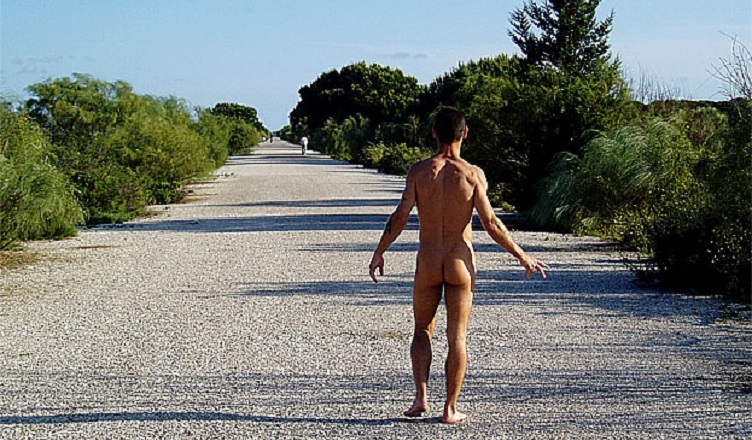From Isaiah 18-22
 Isaiah continues pronouncing judgement on a series of nations through today’s chapters. In today’s passage the LORD commands Isaiah to do something strange and dramatic. Perhaps you might say revealing. If you saw someone walking down the street naked and barefoot, what would you think?
Isaiah continues pronouncing judgement on a series of nations through today’s chapters. In today’s passage the LORD commands Isaiah to do something strange and dramatic. Perhaps you might say revealing. If you saw someone walking down the street naked and barefoot, what would you think?
This post is part of my bible in a year series.
Passage and Comments
Isaiah begins, giving us a little context for what is about to happen.
20 In the year that the commander in chief, who was sent by Sargon the king of Assyria, came to Ashdod and fought against it and captured it—
2 at that time the LORD spoke by Isaiah the son of Amoz, saying, “Go, and loose the sackcloth from your waist and take off your sandals from your feet,” and he did so, walking naked and barefoot. (Is 20:1–2)
Archaeological evidence helps us out a bit here with the context.
An inscription by Sargon fills out this picture. The Philistine city of Ashdod had revolted against Assyria, which promptly deposed its king. A new ringleader, Yamani, carried on the struggle with pledged support from Egypt and Ethiopia and had also approached Judah. (Kidner, F.D., 1994. Isaiah. In D. A. Carson et al., eds. New Bible commentary: 21st century edition. Leicester, England; Downers Grove, IL: Inter-Varsity Press, p. 645.)
‘Loose your sackcloth’. Isaiah is told to remove his standard prophet garb and remove his sandles. (In all probability Isaiah was still wearing a loincloth.) Isaiah does so and begins to walk around.
If you saw someone walking down the street naked and barefoot what would you think?
Stare? Run away? Give him some clothes? Call the police? It certainly must have been a strange sight and a brave thing for Isaiah to do. Normally Ezekiel is the person to do things like this.
The LORD gives Isaiah a reason to explain to others why he is doing this.
3 Then the LORD said, “As my servant Isaiah has walked naked and barefoot for three years as a sign and a portent against Egypt and Cush,
4 so shall the king of Assyria lead away the Egyptian captives and the Cushite exiles, both the young and the old, naked and barefoot, with buttocks uncovered, the nakedness of Egypt. (Is 20:3–4)
Isaiah’s nudie walk was actually a future prediction what the LORD will inflict on Egypt and Cush.
Egypt and Cush will be conquered by the Assyrians. They will be led away naked and barefoot into exile. Away from their homeland.
We should assume Isaiah does and says all this in Judah, probably Jerusalem. Isaiah’s demonstration has a serious message for Judah who were tempted to offer their support for Ashdod.
5 Then they shall be dismayed and ashamed because of Cush their hope and of Egypt their boast. 6 And the inhabitants of this coastland will say in that day, ‘Behold, this is what has happened to those in whom we hoped and to whom we fled for help to be delivered from the king of Assyria! And we, how shall we escape?’ ” (Is 20:5–6)
It seems Egypt and Cush were Judah’s hope and boast. They looked to them for protection from Assyria, just as Ashdod did.
If they are hoping and boasting in Egypt and Cush for these protection they are not looking at the LORD.
Where do your hopes lie when you see trouble brewing? Who do you boast in?
Isaiah has exposed butt naked and barefoot their false hope and empty boasting. His discomfort and humiliation were the price of his people’s safety.
Story of Israel

Isaiah’s powerful dissuasion turned out to be fully justified: Egypt failed to fight, Ashdod was subjugated, and Yamani, who had fled to Ethiopia, was handed over to the Assyrians’ tender mercies. (Kidner, F.D., 1994. Isaiah. In D. A. Carson et al., eds. New Bible commentary: 21st century edition. Leicester, England; Downers Grove, IL: Inter-Varsity Press, p. 645.)
Assyria came in and conquered Egypt and Cush. Assyria will then conquer Israel. Its seems Judah took Isaiah’s warning seriously and they avoided Egypt and Cush’s fate.
But, in the long run Judah did not learn from all these examples and persisted in rejecting the LORD. Ultimately many of them were either killed or led out of the promised land in the same way.
Story of Jesus
In the New Testament there are many instances where people hope and boast in the wrong things. Like we saw with Judah, many were tempted to put their hope in worldly powers.
Inversely, the Gospel gets us to put our hope in a man stripped of clothes, hanging on a cross. Who beared it all for everyone to see.
23 When the soldiers had crucified Jesus, they took his garments and divided them into four parts, one part for each soldier; also his tunic. But the tunic was seamless, woven in one piece from top to bottom, 24 so they said to one another, “Let us not tear it, but cast lots for it to see whose it shall be.” This was to fulfill the Scripture which says,
“They divided my garments among them, and for my clothing they cast lots.” (Jn 19.23-24)
Jesus is the near naked man we need to be paying attention to. Beaten, robbed of clothes and humiliated for us.
Jesus died for our sins and rose again to new life, proving himself to be the promised Christ. He is more than a prophet, he is our King.
Don’t be like Judah, hoping and boasting in the powers of this world. Keep hoping in Jesus and boasting in his cross.
Copyright © Joshua Washington and thescripturesays, 2014-17. All Rights Reserved.

